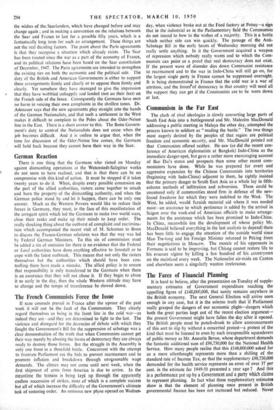Communism in the Far East
The clash of rival ideologies is slowly converting large parts of South East Asia into a battleground and Mr. Malcolm MacDonald addressing a public meeting in Malaya the other day, attempted the process known to soldiers as "reading the battle." The two things most eagerly desired by the peoples of that region are political freedom and economic security, and Mr. MacDonald pointed out that Communism offered neither. He saw (as did the recent con- ference of American diplomatists at Bangkok) Indo-China as the immediate danger-spot, but gave a rather more encouraging account of Bao Dai's status and prospects than some other recent com- mentators have done. While he was prepared for overt and aggressive expansion by the Chinese Communists into -territories (beginning with Indo-China) adjacent to them, he rightly insisted that the primary danger to South East Asia as a whole lay in fifth- column methods of infiltration and subversion. These could be countered only if communities stood firm in defence of the new- found freedoms for which they were indebted to the West. The West, he added, would furnish material aid where it was needed most—an assurance to which pertinence is added by the arrival in Saigon over the week-end of American officials to make arrange- ments for the assistance which has been promised to Indo-China. In China, meanwhile (on the development of whose policy Mr. MacDonald believed everything in the last analysis to depend) there has been little to engage the attention of the outside world since Mao Tse-tung and his Foreign Minister returned to Peking from their negotiations in Moscow. The morale of his opponents in Formosa is said to be improving, but Chiang cannot restore life to his evacuee regime by killing a few hundred of his countrymen on the mainland every week. The Nationalist air-raids on Canton and elsewhere seem a singularly wanton irrelevance.


































 Previous page
Previous page